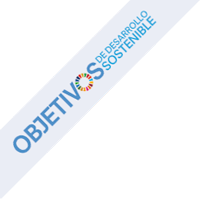
With the conference ‘The 2030 Agenda: challenges for the university’, held on February 9 at the Cordoba Campus of Loyola Andalucía University, Gabriel Ferrero, Advisor for the 2030 Agenda of the Ministry of Foreign Affairs and Cooperation of Spain (MAEC), was in charge of inaugurating the permanent seminar ‘Contributing from the university to the achievement of the SDGs from its research mission‘. This initiative is coordinated by the ETEA Foundation and Loyola Andalucía University with the support of the Secretary of State for International Cooperation and Ibero-America and the Caribbean (SECIPIC) of the Spanish Ministry of Foreign Affairs and Cooperation (MAEC). The remaining 7 sessions that make up the permanent seminar will take place over the next few months.
Gabriel Ferrero gives us some key points about the 2030 Agenda and the Sustainable Development Goals:
Question (Q): Will we achieve a sustainable world by 2030?
Answer (A): At least a more sustainable one, I am confident that the sustainable development goals will be achieved, they have a very high horizon but it is clear that much progress will be made.
(Q): Among the objectives established, which would you highlight?
(A): All seventeen are equally important because if you remove any of them, the rest cannot be achieved. But in spite of that, I think that number one, which is to eradicate extreme poverty and poverty in all its dimensions and in all places, stands out above all the others. It’s the one that has people at the center.
(Q): As you said earlier, it is a very ambitious agenda, is it feasible to achieve it?
(A): Yes, it is ambitious, but without ambition people do not move, an ambition that motivates. It is not possible to predict whether it can be achieved in its entirety, despite the technology, the knowledge that we have and that is applicable. But the ambition to achieve them has to move us and make them possible.
(Q): And to achieve them, who has to get involved, what tools have to be used?
(A): All institutions, all public, private, university, education, business, government and the United Nations, of course, at all levels, must be involved. None of these actors can do it alone, they have to work together, otherwise it is impossible.
(Q): How is Spain getting involved?
(A): Like all countries, Spain still has a lot to do. As I said, the objectives are very ambitious, some more than others, and some objectives are also more ambitious in some countries than in others. Only two years after the entry into force of the Agenda, countries have taken very strong steps and Spain has also done so. Everyone, to a greater or lesser extent, some a little more, others less, at all levels, is moving. There are large and small cities, towns and villages that have adopted the Agenda as a commitment to the future of their places and there are Autonomous Communities that have already incorporated it into their government plans. The Government of Spain itself has also taken important steps, in July it will present itself for Voluntary Review before the United Nations and has set up a High Level Group for coordination between all the ministries, chaired by a minister and co-chaired by two ministers. In short, these are very decisive steps and by July we expect to have a concrete Action Plan for the implementation of the Agenda.
(Q): We talk about sustainable objectives and it seems that everything revolves around governments, institutions… But what role do citizens play in achieving them?
(A): The sustainable development goals become a reality in people, in families, in couples, in the way they relate to the world and from there upwards, not only from the top downwards. In the neighborhoods, in the villages, in the companies where we work, in the universities where we teach… wherever we are, it is the action of each one of us that will make the Agenda a reality. Without leadership from the authorities it is not possible, nor can it be achieved with individual action alone, but the combination of the two can make a big difference.
(Q) How would you assess the advisory work being done by the team of Loyola researchers?
(A): It is very positive, firstly because we are working with the University, which always guarantees working with public policies and with the generation of knowledge and evidence and also, in particular, Loyola University is doing an impressive job, as is typical of its trajectory. Loyola University -and the former ETEA- have always distinguished themselves for their commitment to those public policies that have the greatest impact on improving the situation of people and their environment, here and in other countries, and in helping the most disadvantaged.
LOYOLA AND THE ETEA FOUNDATION ADVISE ON THE DEVELOPMENT OF THE 2030 AGENDA.
Two years after the Sustainable Development Agenda was approved at the UN, with Spain’s commitment to comply with it, our country next July will be submitted for Voluntary Review to the United Nations. In September 2017, the High Level Interministerial Group chaired by the Minister of the MAEC was created, which is responsible for coordinating the implementation of the 17 Sustainable Development Goals in Spain.
The Group has already started work on the preparation of an Action Plan for Spain’s 2030 Agenda, which will be one of the key instruments to make it a reality and a central element of the Voluntary National Review. The High Level Group has requested advice from Loyola University and the ETEA Foundation, which will be developed by a group of teachers and researchers led by Professor Mª Luz Ortega Carpio of the Department of International Studies and including Professors Ana Hernández Román and Gloria Martínez Cousinou.
Fuente de la noticia: LoyolaAndNews


